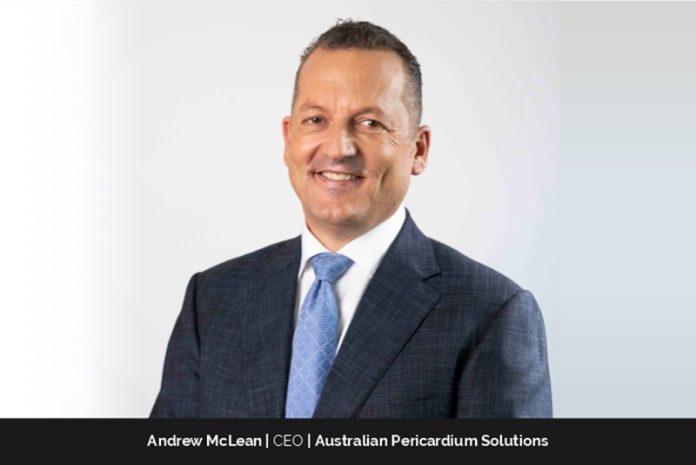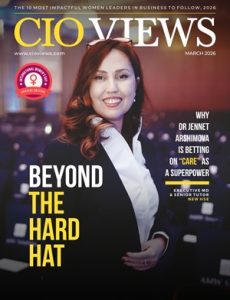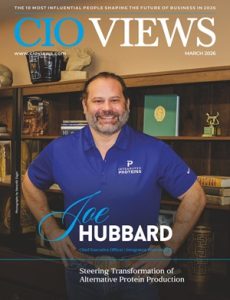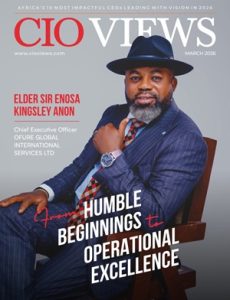Andrew McLean, CEO Australian Pericardium Solutions Pty. Ltd., is a transformative leader committed to innovative solutions in the healthcare sector. With a strong focus on serving others, he champions a leadership style that prioritizes empathy and connection, fostering a collaborative and supportive environment for his team.
Shifting Perspectives on Success
Andrew’s definition of success has evolved over the decades. In his 30s, he focused on money and status to define his success. However, as he entered his 40s, especially during the COVID-19 pandemic, his focus shifted to health and the positive influence he can have on others.
Living in Melbourne, the world’s most locked-down city during the pandemic, profoundly impacted his outlook. “COVID decimated business and rearranged ethics and priorities,” Andrew reflects. He now prioritizes ethics and respect, stating, “I respect consistency more now, and I get a lot of joy out of the daily process of building this enterprise.”
As CEO of a MedTech business, Andrew emphasizes meticulous attention to detail. “Everything is about process and doing every single thing correctly.” His concern has shifted from long-term outcomes to ensuring that his staff, shareholders, and partners are treated with respect. “I sleep well knowing I’ve done the right thing.” A part of this respect is ensuring he continually protects his people from negative influences. “A good CEO not only attracts good people; he/she must be quick to eradicate anyone injurious towards the culture of the organization.”
Andrew believes in making a positive impact in every interaction, stating, “People should always walk away from every interaction with you feeling better, if you do this authentically, you’ll have a lot of success personally and professionally.” His decision-making is now more measured; he emphasizes that reactivity often leads to damaging outcomes. “When I take a breath, stand back, and assess my reaction, the outcome is always positive.”
In the MedTech industry, where errors can be diabolical and financially disasterous, Andrew stresses the importance of strict adherence to processes and regulatory standards. “In MedTech the process is either right or wrong,” he notes, highlighting the severe consequences of mistakes. Reflecting on his journey, he acknowledges that MedTech requires a level of patience he lacked in his 30s, valuing expertise in every facet of the business and recognizing that success is built on absolute commitment to the detail.
From Procurement to Saving Lives
Andrew’s entry into MedTech began unexpectedly through his procurement background. “I was approached about sourcing tissue from the meat processing industry in Australia,” he recalls. What started as a simple task quickly evolved into a deeper understanding of the complexities involved.
Initially, Andrew thought his role was merely about sourcing bovine pericardium tissue used as leaftets for heart valve manufacturing. “I read every piece of information I could find about bovine pericardium,” he says. However, he soon realized the process involved stringent regulatory approval and certification in quality management systems, logistics, and biotech engineering. He attracted industry experts to APS, including a leading cardiologist, an international biochemistry expert, and senior executives proficient in risk management and compliance, to navigate these intricacies.
Andrew describes transforming discarded offal—the pericardial tissue encasing a cow’s heart—that would otherwise be incinerated or sent to landfill. “Instead of discarding it, we sterilize, fix the tissue with chemicals, and decellerize the tissue, which becomes a leaflet within a heart valve used in transcathedar aortic heart surgery to save lives,” he explains.
Their tissue product, derived from bovine pericardium, extends beyond heart valves to general surgery such as neurology, hernia repairs, orthopedics, reconstructive dentistry, and more. This sustainable practice of turning waste into life-saving medical products gives him a sense of authenticity and purpose. “You’re converting something that was going to be discarded into a component that saves someone’s life. It’s an extraordinary medical development.”
Navigating the Early Challenges of a Startup
Starting Australian Pericardium Solutions (APS) came with familiar challenges: finding customers, securing cash flow, and managing operations and balancing time. “It’s very much a chicken and egg situation,” Andrew explains. “People don’t want to deal with you without regulatory approval and approved QMS, and you can’t get either without significant capital or without revenue; it’s impossible to build the infrastructure to do so.” As a start-up, he shifted focus to daily tasks, adopting the mantra, “Concentrate on which task will bring us closer to revenue.”
A key lesson for Andrew was to set aside ego and recognize the importance of asking for help even as a CEO. “I don’t believe in the term fake it until you make it. That implies you’re being illegitimate.” Andrew emphasizes meticulous note-taking: “Every meeting, I write down every single thing discussed.” Documenting discussions ensures accountability and clear communication as he sends out minutes for all meetings and believes efficient meetings always include an egenda.
The unpredictability of startups requires resilience and risk acceptance. “You must have a proclivity toward risk,” Andrew states, stressing the importance of judgment. “Certain things can be risky in a start-up, but you don’t take risks with your investors, and you certainly don’t with regulatory standards—there is no such thing as a commercial decision in MedTech—it complies or it doesn’t.” Experience has also taught Andrew the value of patience. This wisdom helps him navigate the complexities of leading APS.
Navigating COVID Disruptions and Building a Resilient Medtech Business
Australian Pericardium Solutions (APS) commencement coincided with the onset of COVID-19, but this timing worked to their advantage. “There were no full-time employees, little capital had been spent, and no infrastructure in was place,” Andrew explains. While others faced closures due to the health concerns around abattoirs, Andrew used the downtime to structure the business and outline essential steps for success.
Despite the slowdown, Andrew seized the opportunity to learn more about the medical landscape, engaging with professors and scientists to deepen his understanding.
This foundational work helped APS evolve into a firm with a highly skilled team. “I can say ‘we’ now because I’ve got a wonderful board and a team of C-suite executives fully invested in what we’re doing,” he notes.
His chief medical officer constantly reinforces the company’s ethos: “In MedTech, it all comes down to the 4 P’s—it’s the people, the people, the people, and the product.” Andrew believes APS has assembled a world-class team with significant experience, asserting, “People will see that we have a seat at the table, and we’re an authentic business with a lot of substance; we are primed to disrupt this industry.”
APS differentiates itself in the competitive MedTech field through expertise across multiple disciplines and an exclusive commercial arrangement with China. Andrew’s extensive experience over 2 decades trading in China leads to his belief, “You can’t do business in China on Zoom,” Andrew emphasizes. The company’s plans include developing patented technologies around the processing and “fixing” of pericardium tissue and collaborating off existing expertise to develop the APS Transcathedar Aoartic Valve (TAVI/TAVR).
Another advantage for APS with the move into China is the use of Australian bovine tissue, bovine pericardium is both approved and preferred by the FDA for export due to Australia’s clean record on BSE (mad cow disease). “You can’t sell a valve on the world market (outside of China) without FDA-approval, and the FDA won’t approve a valve with Chinese-grown pericardium tissue,” Andrew explains, creating a strong position for APS in this market.
Although APS is continuing its ISO Quality Management Program and regulatory approval processes, Andrew is confident in the groundwork they’ve laid. Looking ahead, he’s committed to APS for at least the next 20 years, pledging to drive product innovation. “We’ll have patents on our manufacturing and processing techniques, we have engineering concepts on our own device and thousands of lives will be saved by the valves we manufacture,” he says. “We’ve spent a lot of time solidifying the relationship with our Chinese partner, our supplier relationships, and on technical innovation, and that will all come to the fore as we deliver more of what we’ve promised.”
Innovation Drives Long-Term Success and MedTech’s Unique Challenges
Innovation is crucial for APS’s growth and shareholder value, with Andrew viewing it as a long-term strategy. “Innovation is a step-by-step process,” he explains, emphasizing its importance for ensuring the business thrives beyond the next few years. He believes that continuous innovation is essential for long-term prosperity, rather than merely reacting when competitors close in.
APS promotes integration across departments, allowing innovation to run “in parallel” with core business operations. Andrew envisions APS as a leader in tissue supply, with innovative, patented products and a potential medical device division. “We need people focused on their role,” he states, highlighting the importance of senior executives understanding the entire business.
MedTech offers unparalleled returns for successful companies, with major players like Edwards Lifesciences, Boston Scientific, Abbott, and Medtronic thriving on constant innovation and acquisition. Andrew likens getting into the MedTech industry to plunging into an “ice bath”— it sound fulfilling and rewarding but you better have what itv takes as it is painful and challenges very fibre of your being. Once you commit and take the plunge, the rewards are worthwhile. “When you’ve mastered the commitment to it, there’s no feeling like it, and experience only becomes more daunting ” he notes.
On his leadership journey, Andrew identifies self-awareness as his greatest achievement. “Self-awareness and consistency are what I focus on,” he says. He has gained confidence in his leadership style, implementing a zero-tolerance policy for people who negatively impact team morale. Learning from mentors, he recognizes the importance of “cutting the cord” when someone isn’t a good fit to avoid disrupting the workplace.
Despite APS being in the early stages of its journey, Andrew expresses pride in the business and its people, stating, “I’m very, very proud of this business.” While the company is not yet ready for an IPO, its current progress leaves him optimistic about the future, and seed capital investment has been realized.
Balancing Leadership Demands and Personal Well-Being
As CEO, Andrew manages various responsibilities, prioritizing reflection by setting aside one day per week free from meetings. “Pick one day a week,” he advises, “where you don’t make appointments, so you have the space to think and time to complete tasks that drive the companies strategic direction.”
His time is divided into four key areas: operations, finance, marketing, and corporate advisory, which includes capital raising. “At the end of the day, investors want to know who the CEO is and what he/she is made of,” he notes. Andrew’s involvement extends to joint ventures, managing marketing collateral, and regulatory processes. He spends approximately 25 percent of his time on operations, 25 percent on finance, and the remaining on marketing and projects, including hiring key roles. “Focussing on tasks that will drive revenue is ultimately where my focus will land”.
Balancing personal and professional life is crucial for Andrew. He prioritizes fitness and values sleep, reflecting, “I sleep so much better now than I ever have because my mind and body are in equilibrium.” He recently took his first vacation in years, acknowledging that delaying breaks is detrimental. “If you wait too long for a holiday, you’re not helping anyone.”
Andrew appreciates modern work flexibility, but stresses that you’re a lot more productive in the office than working from home. If I’m honest I hardly ever work from home. To deliver one original phrase to aspiring executives it’s this “get up, dress up, show up”! Andrew uses his extensive travel time productively. “I treat airplanes like work capsules,” he says. He emphasizes the importance of clearly defined roles within his team, stating, “If everybody understands what they’re supposed to be doing, they’ll be motivated—everyone must know their role and understand their purpose.”
While he has become more detail-oriented in his leadership, Andrew avoids micromanaging after providing initial guidance. He believes that transparency about goals is vital. By fostering clarity and communication, he cultivates a motivated and focused team, recognizing that many businesses struggle when employees lack direction. “When people don’t know what they need to do, they feel unwanted,” he explains. “The best leaders in any field validate their team regularly; everyone wants to be validated; human beings are addicted to it.”
Innovation and Regulatory Excellence Shape Future Strategies
Andrew outlines a clear roadmap for his company, emphasizing a commitment to innovation. “We must be relevant,” he states, underscoring his goal to ensure the company embodies innovation throughout its growth over the next 20 years, regardless of ownership structure. He aims for industry leadership in certification and regulatory compliance, declaring, “If there are eight regulatory standards, I’m going to have all eight whether they are required or not.”
Regarding the role of AI in MedTech, Andrew believes its significance will continue to grow. “The more sophisticated the industry, the more AI will have an input,” he explains. He observes that younger scientists and biotech engineers are adapting their approaches to seamlessly integrate AI into their work. This shift towards AI-driven processes is evident across various technical fields, including MedTech and bioengineering, reflecting a broader trend of innovation and adaptation in the industry. Andrew makes one point with AI though “AI will contribute to innovation but only the great human minds and brilliant scientists and engineers will ever truly innovate”.
Aspiring Leaders Must Embrace Self-Reflection and Continuous Learning
Andrew offers key advice for aspiring leaders, emphasizing the importance of distinguishing between self-analysis and self-deprecation. He advises, “Analyze yourself every day about how you performed and how you behaved.” He notes that mimicking leadership styles is common, driven by the abundance of information available online. “Work out what your own style is,” he recommends, encouraging leaders to recruit individuals who complement their approach rather than those who merely agree with them. “The single most important thing when recruiting is attitude and behaviour.”
On personal development, Andrew stresses the necessity of self-education. “You need to work harder on yourself than you do on your business every day,” he asserts. He champions the value of reading in-depth, advising leaders to engage with challenging materials. “You’ll learn more about managing your team and driving returns in your organization from reading the right book than you will from Harvard Business School,” he says.
Reflecting on leadership challenges, Andrew states, “It’s easy to deal with something when it’s a choice.” While being a CEO comes with difficulties, he highlights the privilege of the role and stresses it’s a choice not and obligation and recounts a conversation with a close friend who’s prominent CEO who explained, “It’s just a job,” underscoring the importance of maintaining perspective amid pressure.
Andrew encourages leaders to remain open to learning, regardless of experience level. “Don’t ever think you’re too smart to learn,” he cautions, advocating for conversations with others to gain fresh insights. In an age dominated by electronic communication, he believes in the power of personal interactions and meaningful dialogue. “Even in an unproductive or toxic meeting, you’re learning—you’re learning what not to do.”
The Power of Serving in Leadership
Andrew defines his leadership style as one rooted in service, believing that serving others yields the best results. “Everything you do in life, if you just focus on giving and serving, you don’t have to worry about all the other stuff,” he asserts. He emphasizes the importance of self-awareness, encouraging leaders to reflect on their behaviors daily as their actions set an example for others.
He lives by the mantra “It’s amazing what can be achieved when no one cares who gets the credit – if you want to be the CEO pass all credit onto your team and take all the heat yourself – that in essence is leadership”.
He underscores a simple yet powerful practice: handwritten notes. “There is nothing more impactful that you can do than pick up a piece of paper or a card and write to someone,” Andrew states. In a digital age, he values the impact of personal, handwritten messages, whether expressing gratitude for support or acknowledging team contributions. “Those little things… are the biggest and most impactful thing a human being can do today.”
Andrew urges leaders to cultivate genuine connections, advising them to remain aware of their team’s challenges and show empathy. “You never know when you walk into the office what someone has been through,” he explains. By fostering a human connection, leaders can create a supportive environment where everyone feels valued.
“Being CEO is a commitment to owning the cultural direction. It’s a commitment to being the most disciplined, the most even tempered, the strongest, the most vulnerable, the most empathetic, but above all, the most loyal.” Andrew believes in loyalty above all else!
He also shares his commitment to personal growth, advocating for reading and lifelong learning. “If I could run a seminar on the importance of reading books and writing letters, I’d end up not needing to do anything else, that would be a thriving business” Andrew believes. Through these practices, he strives to positively impact those around him, reinforcing the notion that leadership is fundamentally about serving others.
Conclusion
Under Andrew’s leadership, Australian Pericardium Solutions is poised to make significant strides in the industry. His dedication to service-oriented leadership drives business success and cultivates meaningful relationships within his organization, setting a standard for future leaders.





